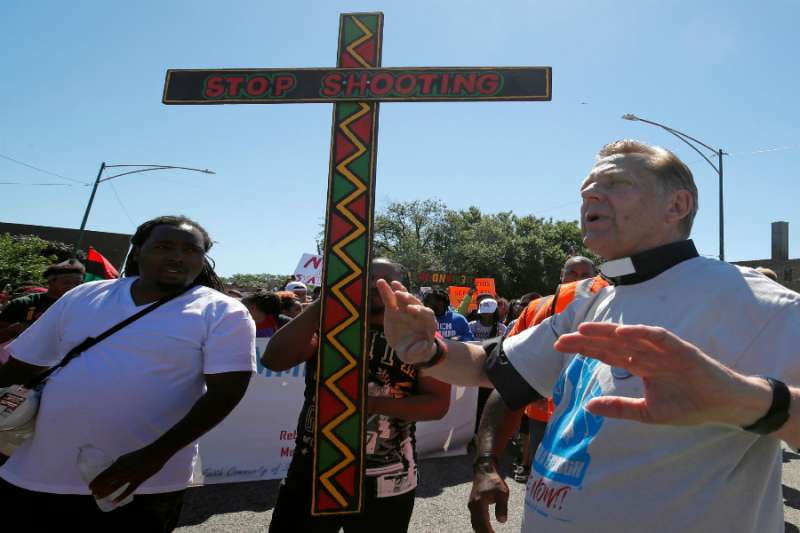Thousands of marchers joined Chicago priest Father Michael Pfleger to protest gun violence on Saturday, shutting down more than a mile of the city’s busiest highway.
Only a portion of Dan Ryan Expressway’s northbound lanes were expected to be closed by the demonstrations, but safety concerns caused police to shut down all the lanes. The priest was pleased with the move, expressing hope that stopping traffic would draw more attention to protestors’ calls for the city to do more to address gun violence.
“We came out here to do one thing: to shut it down,” Father Pfleger, pastor of St. Sabine Catholic Church, told the Chicago Tribune.
“We came here to get their attention. Hopefully we got their attention. … Today was the attention-getter, but now comes the action.”
Pfleger began encouraging participation in the march via Twitter and Facebook several weeks ago, urging demonstrators to speak against poverty, unemployment, and crime, especially in Chicago’s South Side neighborhoods.
The demonstration took place shortly after the Fourth of July, during an annual spike in shootings across Chicago. In 2017, 15 people were killed and 87 people were injured by gunshots during the July 4 holiday.
Activists entered the expressway July 7 at 79th Street, at about 10:20 a.m. marching until 67th Street, and exiting the expressway at 12:30 p.m. Many supporters bore anti-violence signs, and Pfleger marched alongside a large cross inscribed with the words “stop shooting.”
For the first hour, the protestors chanted and marched along the right lanes and grassy shoulder of the highway. When large crowd began to overwhelm the police safety lines, city authorities decided to close the remaining inbound lanes.
U.S. Representative Danny Davis, whose grandson was killed in a South Side shooting in 2016, attended the march, as did the Rev. Jesse Jackson, a Baptist minister and civil rights activist, and Rev. Harolynn McIntosh, the pastor a South Side church.
The event was supported by Chicago Mayor Rahm Emanuel, whose mother was an activist during the civil rights movement.
According to the Chicago Sun Times, the mayor reached out to Illinois Governor Bruce Rauner and Cardinal Blase Cupich, the Archbishop of Chicago, to discuss logistics of the demonstration.
“I just figured there had to be a common-sense way to do this and figure it out,” he said. “So I called [Governor] Bruce.”
“Look, we were in need of a way to declare our independence from violence,” he said. “What better time to do it then a time when we celebrate our own nation’s independence.”
Before the march, Governor Rauner agreed to support a compromise plan which left two inbound lanes open. After the event, the governor tweeted that he was “disappointed in the Mayor,” because additional lanes were closed, though the move to open the remaining lanes to demonstrators was reportedly seen as an operational decision made by police on-site.
Cardinal Cupich also expressed support for the protest. He issued a series of tweets on Saturday, pointing to the power of nonviolent demonstrations, and applauding Catholic involvement.
“Non-violent action and peaceful protest have the power to create change. The change we need in this moment is to end a culture of violence and indifference,” he wrote in a July 7 tweet.
“I applaud the courage shown by young people in our city and across the country demanding their right to life and human dignity, given by God and guaranteed by our nation’s founders.”
St Sabina Church has previously promoted anti-gun demonstrations. The parish led protests at the Chicago Civic Center downtown on June 4 and in the Auburn Greshman neighborhood on June 15.

